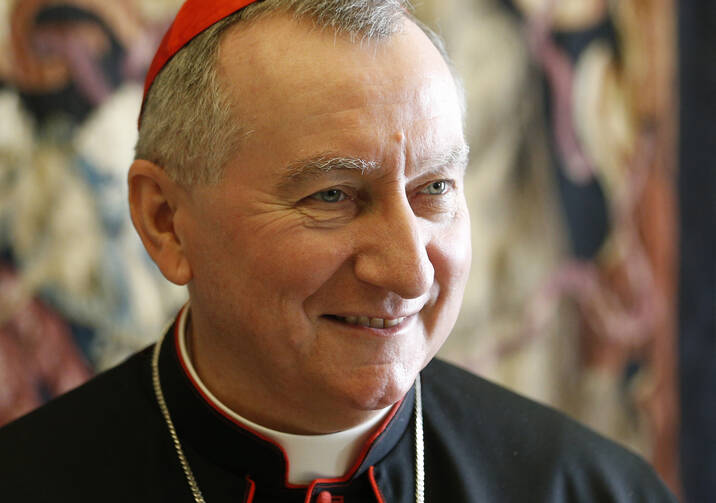Religious leaders have a grave and urgent responsibility to act against genocide, war crimes, ethnic cleansing and other violence committed in the name of religion, said speakers at a United Nations panel on Sept. 20.
They can help prevent atrocities and promote peace and reconciliation within and beyond their communities, the panel said.
Religion has a rightful place in the public sphere, the speakers said, adding that enshrining a proper interpretation of freedom of religion in international law can encourage dialogue and enhance human rights.
"Today, as in the past, religions are being manipulated to incite intolerance and hatred against individuals, groups or entire populations," said Cardinal Pietro Parolin, the Vatican secretary of state.
Religious leaders have a responsibility, especially in an ever more connected world, to help counter the spread of hatred and violence in the name of religion and to promote more inclusive and peaceful societies, he said.
Catholic, Jewish, Muslim and Baha'i speakers addressed the Responsibility to Protect, a global political commitment endorsed by all U.N. member states in 2005 to prevent genocide, war crimes, ethnic cleansing and crimes against humanity.
Religions are not the cause of conflicts and wars, but can be used or misused by determined groups that stand to gain by fueling hostilities, they said. There is a temptation to hide the real cause of despicable violence by attributing it to religion, the Vatican secretary of state said.
Cardinal Parolin said although national authorities have the primary responsibility to prevent crimes, others also have a duty to refrain from inciting tension and conflict that could become the breeding ground for committing hateful crimes. This duty includes not supplying weapons and financing to perpetrators, as well as taking positive measures both to end arms trafficking and the direct or indirect financing of atrocities.
Authorities also should consider the reach of social communications and "refrain from promoting ideologies that incite intolerance, hatred, violence, contempt for life and denial of the dignity of the human person," Cardinal Parolin said.
All religions aspire to peace, the speakers said.
"Religious leaders have a two-fold moral responsibility in carrying out their mission," Cardinal Parolin said.
The first is to highlight the principles and values "written in the human heart by God, known as the natural moral law," and the second, to carry out and inspire actions based on respect for life, human dignity, charity, fraternity and solidarity, he said. These serve as preventive actions, particularly when poorly managed tensions could lead to intense forms of religious intolerance.
The cardinal said at all times, religious leaders must condemn abuse of religion and the use of religious texts to justify violence carried out in the name of God or a religion. "As Pope Francis recently said, 'How pleasant it would be if all religious confessions would say: to kill in the name of God is satanic!'" he said.
National authorities must recognize and ensure religious freedom as an inalienable human right, Cardinal Parolin said. "Confining religion only to the intimate sphere of the person risks the development of a culture of intolerance."
The international community must reject restrictive interpretations that relegate religion to the private sphere of individuals, preventing a rightful role of religion in the public sphere," he said.
"If religion is mistakenly considered to be a cause of intolerance, violence and hatred, then there will also be a tendency to believe that by relegating it to the private domain, religious tolerance may be eliminated" and thus promote peaceful coexistence, Cardinal Parolin said.
Such reasoning is flawed and counterproductive and does not encourage dialogue that leads to mutual understanding, he added.
U.N. Undersecretary-General Adama Dieng said people are more likely to live in peace in nations that value diversity and pluralism, protect rights and do not exclude segments of the population based on religious identity.
In fragile societies, "hate speech" is a precursor to violence against religious and ethnic groups, Dieng said. "We must do more to support religious leaders who speak against violence and engage voices, especially among less mainstream leaders. We can sow the seeds of transformation," he said.
Bani Dugal, principal representative of Baha'i International to the United Nations, said religious leaders must reject bias and bigotry on the basis of sect, dogma or doctrine. They must rely on divine assistance and act on their shared belief that service to humanity is service to God, she said.
Imam Yahya Pallavicini, president of the Italian Religious Islamic Community, said: "Preventing radicalism, ethical relativism and the utopia of a world without God is possible by coordinating the forces of dialogue and education between Jews, Christians and Muslims and renewing the value of fraternity."
Rabbi Arthur Schneier, a Holocaust survivor and president of the Appeal of Conscience Foundation, said mutual respect for religions should be disseminated through seminaries, and religious leaders should create a united stance in favor of protecting houses of worship and against terror without borders.
The side event, "Upholding the Responsibility to Protect: The Role of Religious Leaders in Preventing Atrocity Crimes," was hosted by the Permanent Observer Mission of the Holy See to the U.N.








